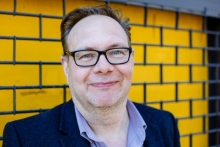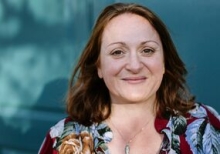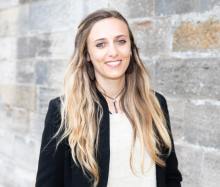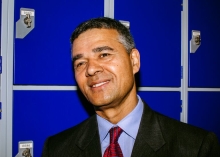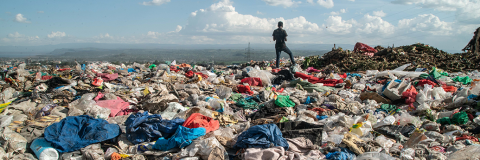

Working globally to end plastic pollution
Photo by James Wakibia
We’re on a mission to tackle the plastics crisis.
Radical action is needed to stop the damaging impacts of plastic pollution on health and the environment. There’s no time to waste.
Our researchers are driving change towards a more sustainable future. We are:
- Analysing plastics policy worldwide
- Pioneering the use of arts-based research methods to address plastic pollution
- Engineering enzymes to break down plastic faster
- Developing new, sustainable materials
- Working to transform the potential of plastic recycling and reuse
- And furthering the world’s understanding of how microplastics affect us all
Our mission is to urgently confront the global plastics crisis through inclusive, solutions-focused research and innovation to support the transition to a sustainable plastics future.
We're putting research into practice, addressing plastics pollution and building a globally relevant community of plastics researchers. We see a vital role for the University as an independent, objective evidence provider at the interface of government, businesses, citizens, and academia.
Introducing the Revolution Plastics Institute
Revolution Plastics Institute
Dr Noorin Khamisani
I think that what's really sad is that the state of our planet right now is that it is drowning under the plastic waste.
Dr Cressida Bowyer
Whether it's macroplastics, microplastics or nanoplastics, we now find these plastics everywhere on the planet.
Prof Steve Fletcher
From the top of the tallest mountain to the bottom of the deepest ocean.
Prof Alex Ford
We're seeing it washing up on our shores all around us as we speak.
Dr Cressida Bowyer
We also find them in our bodies.
Dr Noorin Khamisani
It's out of control.
Dr Cressida Bowyer
The environmental and ecological challenges we're facing are that plastics are interfering with healthy functioning of ecosystems.
Prof Alex Ford
We have got a chemical crisis, the biodiversity crisis and the climate crisis.
Prof Steve Fletcher
The Revolution Plastics Institute has a really strong mission driven research agenda to tackle the negative effects of plastic pollution across the entire plastics lifecycle.
Prof Fay Conceiro
Collaboration within our group in the University of Portsmouth is absolutely essential to finding how to deal with the problem of plastics.
Prof Alex Ford
We need to be able to live sustainably. And to do that, you need to have those people that understand the different components of how society works.
Prof Steve Fletcher
We can have all the scientific and economic and social evidence we need, but ultimately it's about changing policy to actually make a difference.
Hugo Lynch
Industry is not aware about what the chemical composition of their plastics is, what happens when it breaks down and what the effect of that is when it's made into something else. Researchers leading the direction in terms of gathering knowledge and sharing recommendations is the only way we're going to move the dial.
Noga Levy-Rapoport
The research has an incredibly important role to offer. We know that political education, when packaged publicly in an accessible way, can totally transform the way that people envision a sustainable future.
Dr Cressida Bowyer
Portsmouth as a case study site is a very interesting place because it's an island city.
Prof Alex Ford
It is a mesocosm of what's going on around the UK and what's going on around the globe.
Prof Steve Fletcher
Portsmouth is the perfect place to host the Revolution Plastics Institute because Portsmouth as a city exhibits all of the challenges we face when trying to tackle the global plastics crisis.
So we can test out solutions and ideas here that we can apply elsewhere and hopefully scale up to make a real difference.
Prof Fay Conceiro
If you have hundreds, thousands of people collecting data, you can really build up a good picture of what's happening in our environment.
Prof Steve Fletcher
The goal of the Revolution Plastics Institute is to bring people with us on a journey, whether you're in government. in the private sector, in a campaign group or a member of the public. We've all got a role to play in tackling the global plastics crisis, and that's what our institute will do.
Prof Andy Pickford
We are accumulating vast amounts of plastic waste.
Nigel Salter
We've produced more plastic in the last ten years than in the previous 100 years. We're currently producing 400 million tonnes of plastic waste per year. That's set to double by 2040. And of that plastic waste, only 9% is being recycled.
Dr Noorin Khamisani
We need to be challenging the status quo and we need to transform the way that we work with plastics.
Noga Levy-Rapoport
Our plastic waste is an enormous symptom of our addiction to fossil fuels. This has resulted in a very difficult state for our planet, but crucially, it's resulted in a lot of people feeling like they can't see a way out, a way to live without plastic.
Dr Cressida Bowyer
The abnormal has become completely normal, and people can't actually remember a time when these plastic mountains weren't present.
Nelmo Munyiri
It’s very important that everyone takes action right now, and not tomorrow and not the day after. Not after a year, or after ten years. We need that action right now.
Our multidisciplinary approach to plastics research
The projects we’re working on span across all disciplines combining creativity, research and innovation to address the impact of plastic and achieve sustainability across all aspects of society, politics and the economy.
We’re already making progress. We’ve engineered an enzyme that can break down one of the most polluting plastics; worked with communities in the global south to co-develop solutions to pollution; and studied how microplastics affect our oceans, economy and the air we breathe.
Right now, we’re helping to shape a global agreement to end plastic pollution, examining the effectiveness of existing plastic policies, and working with national governments to support their action on plastic pollution.
High impact areas
Evaluating change across the plastics lifecycle
Lead: Professor Fay Couceiro
- Identifying and analysing the shifting characteristics of the global plastics crisis.
- Gathering data on the sources, pathways and impacts of plastic pollution.
- Assessing the environmental, social and human health impacts of plastic pollution.
Socio-economic solutions to reduce plastic pollution
Lead: Dr Antaya March
- Evaluating and developing policy measures to reduce plastic pollution.
- Using arts-based participatory methods to engage stakeholders and co-develop solutions.
- Assessing the policy, economic, social and cultural enablers for a sustainable plastics economy.
Innovation and technology for a sustainable plastics future
Lead: Professor Andy Pickford
- Enhancing the role of innovation in addressing the global plastics crisis.
- Pioneering enzymatic plastic recycling technologies.
- Developing new technology, materials, business models, and methods to tackle and monitor plastic pollution.

Global Plastics Treaty
In March 2022, a landmark resolution was reached at the United Nations Environment Assembly to develop an international legally binding instrument to end plastic pollution (the ‘global plastics treaty’). The Treaty could transform the way we resource, produce, use and dispose of plastics.
The Treaty negotiations so far have been slow, hindered by strong disagreements between countries. The latest round in August 2025 ended without an agreement. Negotiations are set to resume in February 2026.
Our research is supporting the ongoing international negotiations for the Global Plastics Treaty by supplying policy briefs and scientific guidance to negotiators and decision makers.
Research centres and groups
Global Plastics Policy Centre
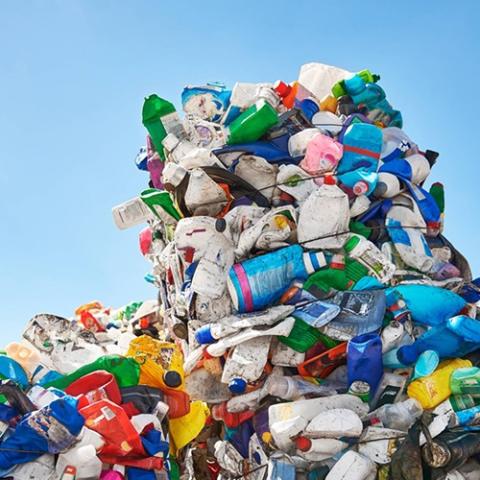
Centre for Enzyme Innovation

Microplastics Research Group
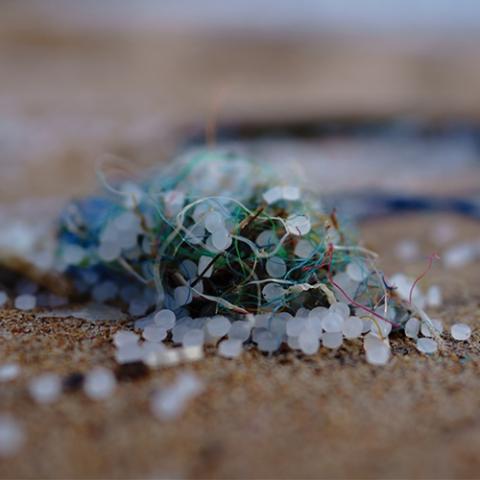
Portsmouth Centre for Advanced Materials and Manufacturing

Publication highlights
2026
Artificial intelligence enhanced litter pollution mapping: integrating citizen science with geospatial and social data
Rezaei, H., Roberts, K., Arabikhan, F., Fletcher, S., March, A. L. A., Couceiro, F., Bacon, D., Hutchinson, D., Williams, J.
1 Feb 2026, In: Environmental Modelling & Software. 197, 18p., 106823
Research output: Article
A study into aspect ratio and the influence of platen restraint on the compressive strength of jute fibre-reinforced compressed earth composites
Ali, M., Cottrell, J. A., Martinson, B., Lavorato, D.
16 Jan 2026, In: Fibers. 14, 1, 31p., 13
Research output: Article
Microplastic dynamics and land contamination in deltaic environments- A systematic review of current understanding and knowledge gaps
Islam, M. A., Hoque, M. A., Couceiro, F., Fowler, M.
1 Jan 2026, In: Environmental Pollution. 389, 13p., 127396
Research output: Article
Research projects
Our work is making a difference. The projects we’re working on span across all disciplines combining creativity, research and innovation to address the impact of plastic and achieve sustainability across all aspects of society, the economy and politics

Assessing pollution in Great Britain's coastal waters with GB Row
In collaboration with GB Row, we're undertaking a detailed survey of microplastics, e-DNA and noise pollution around Great Britain’s waters

Masibambisane
This project used street art, theatre and song and circular economy approaches to reduce open dumping and burning of waste and to increase plastic recycling in KwaMhlanga, Mpumalanga, South Africa.

Microbial transformation of plastics in SE Asian seas: a hazard and a solution (MicroSEAP)
The MicroSEAP project seeks to understand the impact plastic pollution has on marine ecosystems in South East Asia and find solutions to the problem.

Mapping Portsmouth’s Plastic (MAPP)
The world’s first programme of city-wide plastic pollution surveys using a citizen science-based approach.

Mitigating Plastic Pollution Through Heritage Boat Building
A project to establish a boat building training centre to teach local boat builders and students how to design and construct recycled sailing vessels and other products combining indigenous knowledge with modern innovation.
News
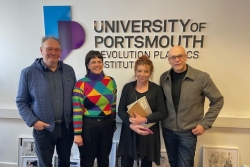
University of Portsmouth appoints two leading plastics experts as Visiting Research Fellows
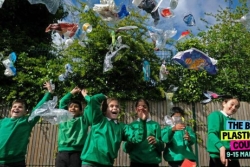
Revolution Plastics Institute partners with Everyday Plastic for the UK’s largest plastic waste survey
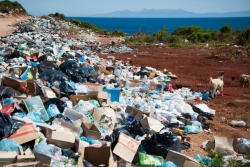
New report sets out urgent recommendations to reset the next phase of plastics treaty negotiations

National survey finds microplastic pollution around Britain’s coastline could be double than previously recorded
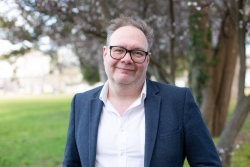
As global plastics treaty talks get stuck in a hiatus, UK leadership comes under the spotlight
Blogs

Plastic waste is a toxic legacy – and an important archaeological record

Three reasons plastic pollution treaty talks ended in disagreement and deadlock (but not collapse)

Sustainable materials innovation at the University of Portsmouth — lessons from the Interreg FLOWER project

Designing Effective Reuse Policy: Insights from a collaborative workshop of global experts
Institute leadership
The Revolution Plastics Institute is led by Professor Steve Fletcher and Professor Cressida Bowyer. Our mission is guided by the expertise of our Advisory Council, composed of senior executives from organisations and sectors that play a role in plastics and sustainability.
Researchers
Contact us
Revolution Plastics Institute
RB 1.10, Richmond Building
Portland St
Portsmouth
PO1 3DE
Email: revolutionplastics@port.ac.uk
Telephone: +44 (0) 23 9284 6240


